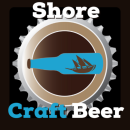I’m going to come right out and say it: I’m a beer conservative. Fast growth makes me wary. Like most conservatives I have what I consider a rational fear of change and worry whether new wrinkles are ill- or well-conceived and if they will force me to make changes in my life I rather would not have.
All of my favorite breweries have begun bottling, canning or both, which is awesome but also makes me nervous. The craft industry is nowhere its ceiling, but physics says if they all arrive there at the same time and velocity it will be bad or something (frankly my physics isn’t what it could be).
Over the past few weeks, however, I’ve gotten to speak with Lori Clough, who owns and runs 3rd Wave Brewing Company with Sue Vickers, and it has made me feel uncharacteristically optimistic about the potential for the future of Delmarva beer distribution.Lori
Overdue, not premature
One of the things people don’t talk about a lot is that the last craft beer bubble burst (in part) under the pressure of a race to get big at all costs. Good breweries and bad alike couldn’t bear the weight of their enthusiasm (or greed, depending upon the brewery). This resulted in mutual gobbling brought on by the misguided notion that Budweiser was the only model for sustained growth.
Hardly any of those things are true anymore. Not only do the local breweries understand more about what growth is and means, but there are better models for doing what you want and doing what you have to do.
Brewers are notorious tinkerers. Each seems to feel as if they have to make an imprint on the beer, which can build in inconsistency to the operation. Lori and the folks at 3rd Wave have a novel solution to that problem. The first, is its Big Barrel bottling program.
Simply put, Big Barrel is 3rd Wave’s first “brand” of bottled beer. It’s the result of putting beer they like into barrels for a year or more just to see what happens. First up is Big Barrel Imperial Stout. The name and the style will always be the same to save confusion and to keep the list of beer names from spinning out of control. Since it is a limited edition, if they do another one in a few more years, they can call it the same thing: Big Barrel IPA, Big Barrel Brown Ale, whatever. It is elegant and (critically) sustainable.
They will also begin bottling (and eventually canning) other beers in the more traditional 12 ounce, and this is where the new craft beer boom parts ways with the old.
BYOB
Lori and Sue were, as have been many local breweries, disposed to getting right into packaging, but they held off for two important (and reassuring) reasons.
The first was that tinkering disposition. Lori knew once they started bottling for a larger market, they wouldn’t be able to safely tweak the recipe. She wanted the recipes locked in which meant not only making them reproducible but also making sure head brewer John Panasiewicz was in it for the long haul. Changing brewers almost always has an effect on a beer.
The second was ensuring that they could increase production without hurting the beer quality. The best way to get on a distributor’s bad said is to short them on your beer.
Lori and the crew clearly have it all under control, which makes me feel better, because 3rd Wave has a particular importance to me that goes well beyond access to good beer.
Unless you’re into dirt track racing, Delmar doesn’t have a lot going for it. When EVO left it was difficult for many of us, having to drive, like, seven miles to the nearest brewery. 3rd Wave fixed that and most of the town is proud of that. For those of us who can’t muster the excitement our neighbors seem to have about the high school football program, 3rd Wave gives us a reason to be proud of our town.
Not that there’s anything wrong with being able to brag that, sometimes, some of our teenagers are better at football than other teenagers in some other small Delaware towns. It’s just nice to have a different point of interest when describing where you live.
